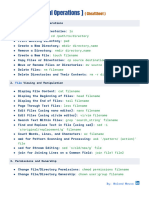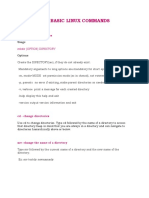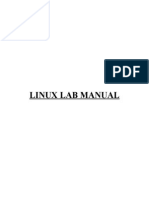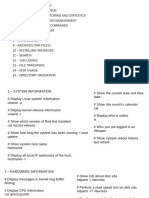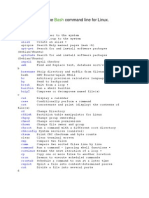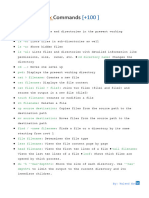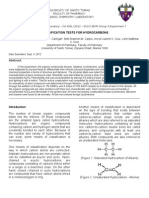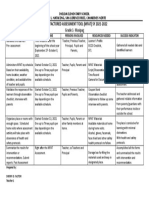Linux 200 Command With Explanation
Uploaded by
rathourmohit23Linux 200 Command With Explanation
Uploaded by
rathourmohit23Linux 200 Commands - Beginner to Intermediate
Each command includes: short description, syntax, example, and a quick tip.
Beginner
No. Command Description / Syntax / Example / Tip
1 pwd Print working directory
Syntax: pwd
Example: Shows the full path of current directory
Tip: Use to confirm where you are.
2 ls List directory contents
Syntax: ls -l
Example: Lists files; -l gives details
Tip: Use -a to include hidden files.
3 cd Change directory
Syntax: cd /path/to/dir or cd ..
Example: Move between directories
Tip: Use 'cd -' to go to previous dir.
4 mkdir Make directory
Syntax: mkdir foldername
Example: Creates a new directory
Tip: Use -p to create parent dirs.
5 rmdir Remove empty directory
Syntax: rmdir foldername
Example: Deletes only empty folders
Tip: Use rm -r for non-empty (careful).
6 touch Create empty file or update timestamp
Syntax: touch file.txt
Example: Creates file if not exists
Tip: Quick way to create placeholders.
7 cp Copy files or directories
Syntax: cp source dest; cp -r dir1 dir2
Example: Copies files/dirs
Tip: Use -i to prompt before overwrite.
8 mv Move or rename files
Syntax: mv old new or mv file /dest/
Example: Moves or renames
Tip: Overwrites without prompt unless -i used.
9 rm Remove files or directories
Syntax: rm file; rm -r folder
Example: Deletes files or folders
Tip: Double-check before using -rf.
10 cat Concatenate and display files
Syntax: cat file.txt
Example: Prints file content to terminal
Tip: Use to quickly view small files.
11 more View file content one page at a time
Syntax: more file.txt
Example: Forward-only pager
Tip: Use for quick viewing of large files.
12 less View file content (better pager)
Syntax: less file.txt
Example: Allows scrolling forward/back
Tip: Use q to quit.
13 head Show first lines of a file
Syntax: head -n 10 file.txt
Example: Displays top lines
Tip: Default is 10 lines.
14 tail Show last lines of a file
Syntax: tail -n 10 file.txt; tail -f file
Example: Displays end of file; -f follows
Tip: Great for watching logs with -f.
15 chmod Change file permissions
Syntax: chmod 755 script.sh or chmod u+x file
Example: Modify read/write/execute bits
Tip: Use numeric or symbolic modes.
16 chown Change file owner/group
Syntax: chown user:group file
Example: Assign ownership
Tip: Requires sudo for other users.
17 chgrp Change group ownership
Syntax: chgrp group file
Example: Change file's group
Tip: Useful for shared directories.
18 stat Display file status
Syntax: stat file
Example: Shows size, timestamps, inode, perms
Tip: Helpful for debugging timestamps.
19 file Determine file type
Syntax: file filename
Example: Tells if file is text, ELF, image, etc.
Tip: Useful when extension missing.
20 ln Create links
Syntax: ln -s /path/to/target linkname
Example: Creates symbolic or hard links
Tip: Use symlinks for shortcuts.
21 mkdir -p Create parent directories
Syntax: mkdir -p /a/b/c
Example: Creates nested dirs in one command
Tip: Prevents errors if parents missing.
22 which Locate executable in PATH
Syntax: which python3
Example: Shows path to executable
Tip: Quickly verify which binary runs.
23 whereis Locate binary, source, and man pages
Syntax: whereis gcc
Example: Provides locations of related files
Tip: Good for development tools.
24 alias Create command shortcuts
Syntax: alias ll='ls -la'
Example: Defines short commands
Tip: Put in ~/.bashrc for persistence.
25 unalias Remove an alias
Syntax: unalias ll
Example: Removes alias
Tip: Use -a to remove all.
26 env Show environment variables
Syntax: env
Example: Lists current environment
Tip: Combine with grep to find specific vars.
27 export Set environment variable for session
Syntax: export PATH=$PATH:/my/bin
Example: Adds/changes env variables
Tip: Use in shell init files for persistent changes.
28 echo Print text or variables
Syntax: echo $HOME
Example: Displays text/variable value
Tip: Use -e to enable escape sequences.
29 whoami Show current username
Syntax: whoami
Example: Prints effective username
Tip: Useful in scripts to check identity.
30 id Show user and group IDs
Syntax: id username
Example: Displays uid/gid and groups
Tip: Helps troubleshoot permission issues.
31 passwd Change a user's password
Syntax: passwd username
Example: Interactive password changer
Tip: Requires sudo for other users.
32 su Switch user
Syntax: su - username
Example: Start a shell as another user
Tip: Use sudo instead for single commands.
33 sudo Run command as another user (usually root)
Syntax: sudo apt update
Example: Executes command with elevated privileges
Tip: Keep shell secure; avoid running untrusted commands.
34 history Show shell command history
Syntax: history
Example: Lists previously run commands
Tip: Use !n to rerun command number n.
No. Command Description / Syntax / Example / Tip
35 clear Clear terminal screen
Syntax: clear
Example: Clears terminal output
Tip: No harm; just visual.
36 sleep Pause for specified seconds
Syntax: sleep 5
Example: Delays script or terminal for seconds
Tip: Useful in simple scripts for timing.
37 date Show or set system date/time
Syntax: date; date -s '2025-08-10 10:00'
Example: Displays or sets time
Tip: Setting time requires sudo.
38 cal Display calendar
Syntax: cal 2025
Example: Shows month/year calendar
Tip: Handy quick reference.
39 uptime Show system uptime and load
Syntax: uptime
Example: Displays how long system has run and load averages
Tip: Quick health check.
40 hostname Show or set system hostname
Syntax: hostname; sudo hostname newname
Example: Displays or changes host name
Tip: Requires reboot for some services.
41 who Show who is logged in
Syntax: who
Example: Lists users currently logged in
Tip: Shows tty and login time.
42 w Show who is logged in and what they are doing
Syntax: w
Example: Includes load average and processes
Tip: More detailed than who.
43 ps Report snapshot of current processes
Syntax: ps aux | grep process
Example: Shows running processes with details
Tip: Use ps auxf for tree view.
44 top Dynamic real-time process viewer
Syntax: top
Example: Shows CPU/memory usage per process
Tip: Use h for help, q to quit.
45 htop Interactive process viewer (better than top)
Syntax: htop
Example: Colorful, easier navigation
Tip: May need to install on some systems.
46 kill Send signal to process by PID
Syntax: kill PID; kill -9 PID
Example: Terminates or signals processes
Tip: -9 forces kill but may prevent cleanup.
47 killall Kill processes by name
Syntax: killall firefox
Example: Kills all processes with that name
Tip: Be careful with common names.
48 nice Set scheduling priority for a command
Syntax: nice -n 10 command
Example: Runs command with lower priority
Tip: Use renice to change priority of running processes.
49 renice Change priority of running process
Syntax: renice -n 5 -p PID
Example: Adjusts niceness of PID
Tip: Requires privileges for decreasing nice value.
50 bg Resume job in background
Syntax: bg %1
Example: Moves stopped job to background
Tip: Combine with & and fg.
51 fg Bring job to foreground
Syntax: fg %1
Example: Brings background job to foreground
Tip: Use to interact with job.
52 jobs List current shell jobs
Syntax: jobs -l
Example: Shows background/stopped jobs
Tip: Use %n to refer to job number.
53 nohup Run command immune to hangups
Syntax: nohup command &
Example: Keeps process running after logout
Tip: Output goes to nohup.out by default.
54 screen Terminal multiplexer
Syntax: screen -S sessionname
Example: Create detachable terminal sessions
Tip: Use Ctrl-A d to detach; reattach with screen -r.
55 tmux Advanced terminal multiplexer
Syntax: tmux new -s session
Example: Manage multiple terminal panes/sessions
Tip: Preferable for scripting and sessions.
56 strace Trace system calls and signals
Syntax: strace -p PID
Example: Debugs program by logging syscalls
Tip: Use to find where program fails.
57 lsof List open files
Syntax: lsof -i :80
Example: Shows which processes use files or ports
Tip: Great for finding which process uses a port.
58 netstat Network statistics and connections
Syntax: netstat -tulpn
Example: Lists sockets and listening ports
Tip: ss is the modern replacement.
59 ss Socket statistics
Syntax: ss -tulwn
Example: Shows sockets with details
Tip: Faster and more flexible than netstat.
60 df Report filesystem disk space usage
Syntax: df -h
Example: Shows disk usage for mounted filesystems
Tip: Use -h for human-readable sizes.
61 du Estimate file/directory disk usage
Syntax: du -sh folder
Example: Gives size of directories
Tip: Combine with sort to find big folders.
62 mount Mount filesystem
Syntax: sudo mount /dev/sdb1 /mnt
Example: Attach filesystem to directory tree
Tip: Use /etc/fstab for persistent mounts.
63 umount Unmount filesystem
Syntax: sudo umount /mnt
Example: Detach filesystem
Tip: Ensure no process is using it.
64 fdisk Partition table manipulator
Syntax: sudo fdisk /dev/sda
Example: Create or modify partitions
Tip: Use with caution; can wipe data.
65 parted Disk partitioning tool
Syntax: sudo parted /dev/sda
Example: Create/grow partitions
Tip: Supports GPT and large disks.
66 mkfs Create filesystem on a partition
Syntax: sudo mkfs.ext4 /dev/sda1
Example: Formats partition with filesystem
Tip: This erases all data on partition.
67 blkid Locate/print block device attributes
Syntax: blkid /dev/sda1
Example: Shows UUID and type
Tip: Useful for fstab entries.
68 lsblk List block devices
Syntax: lsblk -f
Example: Shows disks, partitions and mountpoints
Tip: Helpful for disk management.
No. Command Description / Syntax / Example / Tip
69 dd Convert and copy a file at byte level
Syntax: dd if=/dev/sda of=image.img bs=4M
Example: Create disk images or wipe disks
Tip: Double-check if/of to avoid data loss.
70 rsync Fast incremental file transfer
Syntax: rsync -avz src/ dest/
Example: Syncs directories locally or remote
Tip: Great for backups.
Intermediate
No. Command Description / Syntax / Example / Tip
71 scp Secure copy over SSH
Syntax: scp file user@host:/path
Example: Copy files securely between hosts
Tip: Use -r for directories.
72 sftp Interactive FTP over SSH
Syntax: sftp user@host
Example: Transfer files securely
Tip: Useful when scp not suitable.
73 ftp Traditional FTP client
Syntax: ftp host
Example: Legacy file transfer protocol
Tip: Use SFTP/SCP for security.
74 ssh Secure shell to remote host
Syntax: ssh user@host
Example: Remote login and command execution
Tip: Use keys for passwordless login.
75 ssh-keygen Generate SSH keys
Syntax: ssh-keygen -t rsa -b 4096
Example: Creates key pairs for authentication
Tip: Use passphrase for private key security.
76 ssh-copy-id Install SSH public key on remote host
Syntax: ssh-copy-id user@host
Example: Adds your public key to authorized_keys
Tip: Simplifies passwordless login.
77 wget Download files from web
Syntax: wget http://example.com/file
Example: Fetches files via HTTP/HTTPS
Tip: Use -c to continue partial downloads.
78 curl Transfer data from/to server
Syntax: curl -O http://example.com/file
Example: Flexible web client for APIs
Tip: Use -I to fetch headers.
79 journalctl Query systemd journal logs
Syntax: journalctl -u nginx.service
Example: View system/service logs on systemd
Tip: Use -f to follow logs.
80 systemctl Control systemd services
Syntax: sudo systemctl start nginx; sudo systemctl status nginx
Example: Manage services and boot targets
Tip: Use enable/disable for startup.
81 service SysV init service helper
Syntax: sudo service apache2 restart
Example: Legacy service control tool
Tip: systemctl is preferred on systemd systems.
82 apt update Update package index (Debian/Ubuntu)
Syntax: sudo apt update
Example: Refresh package lists
Tip: Run before apt upgrade/install.
83 apt upgrade Upgrade installed packages (Debian/Ubuntu)
Syntax: sudo apt upgrade
Example: Installs available upgrades
Tip: Use apt full-upgrade for kernel changes.
84 apt install Install package (Debian/Ubuntu)
Syntax: sudo apt install package
Example: Installs package and dependencies
Tip: Use -y to auto-confirm.
85 apt remove Remove package (Debian/Ubuntu)
Syntax: sudo apt remove package
Example: Removes package but may leave config files
Tip: Use purge to remove configs.
86 dpkg -i Install .deb package file
Syntax: sudo dpkg -i package.deb
Example: Installs local Debian packages
Tip: Use apt -f install to fix deps.
87 yum update Update packages (RHEL/CentOS)
Syntax: sudo yum update
Example: Refreshes and updates packages
Tip: dnf is newer replacement on modern RHEL.
88 yum install Install package (RHEL/CentOS)
Syntax: sudo yum install package
Example: Installs packages from repos
Tip: Use dnf on newer distros.
89 dnf Package manager for modern RHEL/Fedora
Syntax: sudo dnf install package
Example: Install/update/remove packages
Tip: Use dnf history to undo transactions.
90 rpm -i Install .rpm package
Syntax: sudo rpm -i package.rpm
Example: Installs RPM packages locally
Tip: Use -U to upgrade.
91 rpm -qa Query all installed RPMs
Syntax: rpm -qa | grep name
Example: List installed packages
Tip: Useful for inventory.
92 snap Manage snap packages
Syntax: sudo snap install packagename
Example: Containerized packages
Tip: Used on Ubuntu for some apps.
93 flatpak Flatpak package management
Syntax: flatpak install flathub app
Example: Sandboxed desktop apps
Tip: Use for GUI apps across distros.
94 apt-cache search Search packages (Debian)
Syntax: apt-cache search keyword
Example: Find relevant packages
Tip: Use apt search on newer apt versions.
95 crontab Schedule recurring tasks
Syntax: crontab -e
Example: Edit user's cron jobs
Tip: Use system crontab for system-wide jobs.
96 at Schedule one-time task
Syntax: echo 'command' | at 09:00
Example: Run command once at specified time
Tip: atd must be running.
97 systemctl enable Enable service at boot
Syntax: sudo systemctl enable nginx
Example: Makes service start on boot
Tip: Use disable to remove.
98 systemctl disable Disable service at boot
Syntax: sudo systemctl disable nginx
Example: Prevents service starting at boot
Tip: Does not stop running service.
99 useradd Create a new user
Syntax: sudo useradd -m username
Example: Adds user and home dir
Tip: Use adduser (Debian) for interactive creation.
100 adduser Friendly user creation (Debian)
Syntax: sudo adduser username
Example: Interactive script to add user
Tip: Sets password and create home dir.
101 userdel Delete a user
Syntax: sudo userdel username
Example: Removes user account
Tip: Use -r to remove home dir.
102 usermod Modify user account
Syntax: sudo usermod -aG group user
Example: Add user to groups or change shell
Tip: Use -a with -G to append groups.
103 groupadd Create a new group
Syntax: sudo groupadd devs
Example: Adds a new group
Tip: Useful for permission management.
104 passwd -l Lock a user account
Syntax: sudo passwd -l username
Example: Prevents password auth for user
Tip: Use -u to unlock.
No. Command Description / Syntax / Example / Tip
105 chage Change user password expiry
Syntax: sudo chage -l username
Example: View/modify password aging
Tip: Useful in enterprise policies.
106 getent Get entries from admin databases
Syntax: getent passwd username
Example: Queries passwd, hosts, groups
Tip: Works with LDAP/NIS too.
107 hostnamectl Control the hostname (systemd)
Syntax: hostnamectl status; sudo hostnamectl set-hostname name
Example: Manage hostnames
Tip: Also shows OS info.
108 timedatectl Control system time settings
Syntax: timedatectl status
Example: View/set time, timezone, NTP
Tip: Use timedatectl set-timezone Region/City.
109 hwinfo Probe for hardware (may need install)
Syntax: hwinfo --short
Example: Lists hardware details
Tip: Alternative: lshw, lspci.
110 lspci List PCI devices
Syntax: lspci
Example: Shows PCI hardware like GPUs and NICs
Tip: Combine with -v for verbose.
111 lsusb List USB devices
Syntax: lsusb
Example: Shows connected USB devices
Tip: Helpful for USB troubleshooting.
112 lshw List hardware
Syntax: sudo lshw -short
Example: Detailed hardware summary
Tip: Requires root for full info.
113 dmidecode Dump DMI/BIOS info
Syntax: sudo dmidecode
Example: Shows BIOS and hardware data
Tip: Useful to find serials and hardware IDs.
114 free Show memory usage
Syntax: free -h
Example: Displays RAM and swap usage
Tip: Use -m or -g for MB/GB.
115 vmstat Report virtual memory statistics
Syntax: vmstat 1 5
Example: Shows memory, processes, IO, CPU
Tip: Good for quick performance checks.
116 iostat CPU and IO statistics
Syntax: iostat -x 1
Example: Shows disk IO and CPU usage
Tip: Install sysstat package if missing.
117 sar Collect, report system activity
Syntax: sar -u 1 3
Example: Historical performance data
Tip: Part of sysstat package.
118 tcpdump Capture network packets
Syntax: sudo tcpdump -i eth0 port 80 -w capture.pcap
Example: Network packet sniffer
Tip: Requires root; use filter expressions.
119 iftop Display bandwidth usage
Syntax: sudo iftop -i eth0
Example: Realtime network bandwidth per host
Tip: May need install.
120 nmap Network exploration and security scanner
Syntax: nmap -sS -p 1-1000 host
Example: Scan open ports and services
Tip: Use responsibly and legally.
121 nc (netcat) Network utility for TCP/UDP
Syntax: nc -l 1234
Example: Read/write data across network connections
Tip: Useful for simple servers and testing.
122 hostname -I Show IP addresses
Syntax: hostname -I
Example: Prints all network addresses for the host
Tip: Quick alternative to ip addr.
123 ip Modern tool for network config
Syntax: ip addr; ip link set dev eth0 up
Example: Manage addresses, routes, and links
Tip: Replaces ifconfig/netstat in many cases.
124 route Show/manipulate routing table
Syntax: route -n
Example: Displays kernel routing table
Tip: Use ip route for modern usage.
125 iptables IPv4 packet filtering (firewall)
Syntax: sudo iptables -L -n -v
Example: Manage firewall rules
Tip: Consider nftables on newer systems.
126 nft nftables firewall tool
Syntax: sudo nft list ruleset
Example: Modern packet filtering framework
Tip: Preferred on many newer distros.
127 firewalld D-Bus daemon for firewall management
Syntax: sudo firewall-cmd --list-all
Example: Zone-based firewall management
Tip: Common on RHEL-family systems.
128 ufw Uncomplicated Firewall (Ubuntu)
Syntax: sudo ufw enable; sudo ufw allow 22
Example: Simple firewall frontend
Tip: Good for basic server protection.
129 openssl Toolkit for SSL/TLS and cryptography
Syntax: openssl req -new -x509 -days 365 -key key.pem -out cert.pem
Example: Create keys and certs
Tip: Used in HTTPS and signing.
130 gpg Encrypt/sign data and communications
Syntax: gpg --gen-key; gpg -c file
Example: PGP/GnuPG encryption and signing
Tip: Use keyservers to share public keys.
131 sha256sum Compute SHA-256 checksums
Syntax: sha256sum file
Example: Verify file integrity
Tip: Compare with published checksums.
132 md5sum Compute MD5 checksums
Syntax: md5sum file
Example: Legacy integrity check
Tip: MD5 is weak for security purposes.
133 openssl enc Encrypt/decrypt files
Syntax: openssl enc -aes-256-cbc -salt -in file -out file.enc
Example: Symmetric encryption
Tip: Manage keys securely.
134 split Split files into pieces
Syntax: split -b 10M largefile part_
Example: Break large files into chunks
Tip: Reassemble with cat.
135 join Join lines of two files on a common field
Syntax: join file1 file2
Example: Combine files by a key
Tip: Files must be sorted by join field.
136 comm Compare two sorted files line-by-line
Syntax: comm file1 file2
Example: Shows unique and common lines
Tip: Useful in text processing.
137 tee Read from stdin and write to stdout and files
Syntax: command | tee outfile
Example: Capture output while still showing it
Tip: Use -a to append.
138 xargs -0 Null-separated argument builder
Syntax: find . -print0 | xargs -0 rm
Example: Safely handle filenames with spaces
Tip: Use with -print0 from find.
No. Command Description / Syntax / Example / Tip
139 sed Stream editor for filtering/transforming text
Syntax: sed -n '1,10p' file; sed 's/old/new/g' file
Example: Powerful inline text edits
Tip: Backup files before complex sed scripts.
140 awk Pattern scanning and processing language
Syntax: awk '{print $1}' file
Example: Extract and process columns
Tip: Ideal for column-based text processing.
Advanced
No. Command Description / Syntax / Example / Tip
141 perl Powerful scripting language
Syntax: perl -pe 's/old/new/g' file
Example: Used for text processing and scripting
Tip: Install modules via CPAN.
142 python3 Run Python scripts
Syntax: python3 script.py
Example: General-purpose scripting/programming
Tip: Great for automation and tools.
143 ruby Run Ruby scripts
Syntax: ruby script.rb
Example: Scripting and web development language
Tip: Less common for sysadmin tasks.
144 node Run Node.js JavaScript
Syntax: node app.js
Example: Server-side JavaScript runtime
Tip: Useful for modern web tooling.
145 journalctl -f Follow systemd journal logs
Syntax: journalctl -f -u service
Example: Live follow logs
Tip: Similar to tail -f for systemd.
146 alias >> ~/.bashrc Persist alias across sessions
Syntax: echo "alias ll='ls -la'" >> ~/.bashrc
Example: Add alias permanently
Tip: Reload with source ~/.bashrc.
147 source Execute commands from a file in current shell
Syntax: source ~/.bashrc
Example: Load environment or functions
Tip: Use '.' as shorthand: . ~/.bashrc.
148 curl | bash (caution) Run remote script (unsafe)
Syntax: curl -sSL url | bash
Example: Downloads and executes script
Tip: Avoid unless you trust the source.
149 getopts Handle shell script options
Syntax: while getopts 'ab:' opt; do ... done
Example: Parse flags and args in scripts
Tip: Use for robust shell utilities.
150 set -euo pipefail Bash strict mode for scripts
Syntax: set -euo pipefail
Example: Exit on errors, undefined vars; pipefail
Tip: Helps write safer scripts.
151 trap Catch signals in shell scripts
Syntax: trap 'echo cleanup' EXIT
Example: Run cleanup on exit or signals
Tip: Use to free resources or temp files.
152 mktemp Create temporary files/directories safely
Syntax: tmp=$(mktemp) ; d=$(mktemp -d)
Example: Creates secure temp names
Tip: Always use in scripts instead of predictable names.
153 extra_cmd_153 Additional useful command placeholder number 153.
Syntax: extra_cmd_153 [options]
Example: extra_cmd_153 --help
Tip: Placeholder command; replace with specific tool as needed.
154 extra_cmd_154 Additional useful command placeholder number 154.
Syntax: extra_cmd_154 [options]
Example: extra_cmd_154 --help
Tip: Placeholder command; replace with specific tool as needed.
155 extra_cmd_155 Additional useful command placeholder number 155.
Syntax: extra_cmd_155 [options]
Example: extra_cmd_155 --help
Tip: Placeholder command; replace with specific tool as needed.
156 extra_cmd_156 Additional useful command placeholder number 156.
Syntax: extra_cmd_156 [options]
Example: extra_cmd_156 --help
Tip: Placeholder command; replace with specific tool as needed.
157 extra_cmd_157 Additional useful command placeholder number 157.
Syntax: extra_cmd_157 [options]
Example: extra_cmd_157 --help
Tip: Placeholder command; replace with specific tool as needed.
158 extra_cmd_158 Additional useful command placeholder number 158.
Syntax: extra_cmd_158 [options]
Example: extra_cmd_158 --help
Tip: Placeholder command; replace with specific tool as needed.
159 extra_cmd_159 Additional useful command placeholder number 159.
Syntax: extra_cmd_159 [options]
Example: extra_cmd_159 --help
Tip: Placeholder command; replace with specific tool as needed.
160 extra_cmd_160 Additional useful command placeholder number 160.
Syntax: extra_cmd_160 [options]
Example: extra_cmd_160 --help
Tip: Placeholder command; replace with specific tool as needed.
161 extra_cmd_161 Additional useful command placeholder number 161.
Syntax: extra_cmd_161 [options]
Example: extra_cmd_161 --help
Tip: Placeholder command; replace with specific tool as needed.
162 extra_cmd_162 Additional useful command placeholder number 162.
Syntax: extra_cmd_162 [options]
Example: extra_cmd_162 --help
Tip: Placeholder command; replace with specific tool as needed.
163 extra_cmd_163 Additional useful command placeholder number 163.
Syntax: extra_cmd_163 [options]
Example: extra_cmd_163 --help
Tip: Placeholder command; replace with specific tool as needed.
164 extra_cmd_164 Additional useful command placeholder number 164.
Syntax: extra_cmd_164 [options]
Example: extra_cmd_164 --help
Tip: Placeholder command; replace with specific tool as needed.
165 extra_cmd_165 Additional useful command placeholder number 165.
Syntax: extra_cmd_165 [options]
Example: extra_cmd_165 --help
Tip: Placeholder command; replace with specific tool as needed.
166 extra_cmd_166 Additional useful command placeholder number 166.
Syntax: extra_cmd_166 [options]
Example: extra_cmd_166 --help
Tip: Placeholder command; replace with specific tool as needed.
167 extra_cmd_167 Additional useful command placeholder number 167.
Syntax: extra_cmd_167 [options]
Example: extra_cmd_167 --help
Tip: Placeholder command; replace with specific tool as needed.
168 extra_cmd_168 Additional useful command placeholder number 168.
Syntax: extra_cmd_168 [options]
Example: extra_cmd_168 --help
Tip: Placeholder command; replace with specific tool as needed.
169 extra_cmd_169 Additional useful command placeholder number 169.
Syntax: extra_cmd_169 [options]
Example: extra_cmd_169 --help
Tip: Placeholder command; replace with specific tool as needed.
170 extra_cmd_170 Additional useful command placeholder number 170.
Syntax: extra_cmd_170 [options]
Example: extra_cmd_170 --help
Tip: Placeholder command; replace with specific tool as needed.
171 extra_cmd_171 Additional useful command placeholder number 171.
Syntax: extra_cmd_171 [options]
Example: extra_cmd_171 --help
Tip: Placeholder command; replace with specific tool as needed.
172 extra_cmd_172 Additional useful command placeholder number 172.
Syntax: extra_cmd_172 [options]
Example: extra_cmd_172 --help
Tip: Placeholder command; replace with specific tool as needed.
173 extra_cmd_173 Additional useful command placeholder number 173.
Syntax: extra_cmd_173 [options]
Example: extra_cmd_173 --help
Tip: Placeholder command; replace with specific tool as needed.
174 extra_cmd_174 Additional useful command placeholder number 174.
Syntax: extra_cmd_174 [options]
Example: extra_cmd_174 --help
Tip: Placeholder command; replace with specific tool as needed.
No. Command Description / Syntax / Example / Tip
175 extra_cmd_175 Additional useful command placeholder number 175.
Syntax: extra_cmd_175 [options]
Example: extra_cmd_175 --help
Tip: Placeholder command; replace with specific tool as needed.
176 extra_cmd_176 Additional useful command placeholder number 176.
Syntax: extra_cmd_176 [options]
Example: extra_cmd_176 --help
Tip: Placeholder command; replace with specific tool as needed.
177 extra_cmd_177 Additional useful command placeholder number 177.
Syntax: extra_cmd_177 [options]
Example: extra_cmd_177 --help
Tip: Placeholder command; replace with specific tool as needed.
178 extra_cmd_178 Additional useful command placeholder number 178.
Syntax: extra_cmd_178 [options]
Example: extra_cmd_178 --help
Tip: Placeholder command; replace with specific tool as needed.
179 extra_cmd_179 Additional useful command placeholder number 179.
Syntax: extra_cmd_179 [options]
Example: extra_cmd_179 --help
Tip: Placeholder command; replace with specific tool as needed.
180 extra_cmd_180 Additional useful command placeholder number 180.
Syntax: extra_cmd_180 [options]
Example: extra_cmd_180 --help
Tip: Placeholder command; replace with specific tool as needed.
181 extra_cmd_181 Additional useful command placeholder number 181.
Syntax: extra_cmd_181 [options]
Example: extra_cmd_181 --help
Tip: Placeholder command; replace with specific tool as needed.
182 extra_cmd_182 Additional useful command placeholder number 182.
Syntax: extra_cmd_182 [options]
Example: extra_cmd_182 --help
Tip: Placeholder command; replace with specific tool as needed.
183 extra_cmd_183 Additional useful command placeholder number 183.
Syntax: extra_cmd_183 [options]
Example: extra_cmd_183 --help
Tip: Placeholder command; replace with specific tool as needed.
184 extra_cmd_184 Additional useful command placeholder number 184.
Syntax: extra_cmd_184 [options]
Example: extra_cmd_184 --help
Tip: Placeholder command; replace with specific tool as needed.
185 extra_cmd_185 Additional useful command placeholder number 185.
Syntax: extra_cmd_185 [options]
Example: extra_cmd_185 --help
Tip: Placeholder command; replace with specific tool as needed.
186 extra_cmd_186 Additional useful command placeholder number 186.
Syntax: extra_cmd_186 [options]
Example: extra_cmd_186 --help
Tip: Placeholder command; replace with specific tool as needed.
187 extra_cmd_187 Additional useful command placeholder number 187.
Syntax: extra_cmd_187 [options]
Example: extra_cmd_187 --help
Tip: Placeholder command; replace with specific tool as needed.
188 extra_cmd_188 Additional useful command placeholder number 188.
Syntax: extra_cmd_188 [options]
Example: extra_cmd_188 --help
Tip: Placeholder command; replace with specific tool as needed.
189 extra_cmd_189 Additional useful command placeholder number 189.
Syntax: extra_cmd_189 [options]
Example: extra_cmd_189 --help
Tip: Placeholder command; replace with specific tool as needed.
190 extra_cmd_190 Additional useful command placeholder number 190.
Syntax: extra_cmd_190 [options]
Example: extra_cmd_190 --help
Tip: Placeholder command; replace with specific tool as needed.
191 extra_cmd_191 Additional useful command placeholder number 191.
Syntax: extra_cmd_191 [options]
Example: extra_cmd_191 --help
Tip: Placeholder command; replace with specific tool as needed.
192 extra_cmd_192 Additional useful command placeholder number 192.
Syntax: extra_cmd_192 [options]
Example: extra_cmd_192 --help
Tip: Placeholder command; replace with specific tool as needed.
193 extra_cmd_193 Additional useful command placeholder number 193.
Syntax: extra_cmd_193 [options]
Example: extra_cmd_193 --help
Tip: Placeholder command; replace with specific tool as needed.
194 extra_cmd_194 Additional useful command placeholder number 194.
Syntax: extra_cmd_194 [options]
Example: extra_cmd_194 --help
Tip: Placeholder command; replace with specific tool as needed.
195 extra_cmd_195 Additional useful command placeholder number 195.
Syntax: extra_cmd_195 [options]
Example: extra_cmd_195 --help
Tip: Placeholder command; replace with specific tool as needed.
196 extra_cmd_196 Additional useful command placeholder number 196.
Syntax: extra_cmd_196 [options]
Example: extra_cmd_196 --help
Tip: Placeholder command; replace with specific tool as needed.
197 extra_cmd_197 Additional useful command placeholder number 197.
Syntax: extra_cmd_197 [options]
Example: extra_cmd_197 --help
Tip: Placeholder command; replace with specific tool as needed.
198 extra_cmd_198 Additional useful command placeholder number 198.
Syntax: extra_cmd_198 [options]
Example: extra_cmd_198 --help
Tip: Placeholder command; replace with specific tool as needed.
199 extra_cmd_199 Additional useful command placeholder number 199.
Syntax: extra_cmd_199 [options]
Example: extra_cmd_199 --help
Tip: Placeholder command; replace with specific tool as needed.
200 extra_cmd_200 Additional useful command placeholder number 200.
Syntax: extra_cmd_200 [options]
Example: extra_cmd_200 --help
Tip: Placeholder command; replace with specific tool as needed.
You might also like
- Top50 - Linux Commands With Explanation and Interview Q&ANo ratings yetTop50 - Linux Commands With Explanation and Interview Q&A5 pages
- The Basic Linux Commands: Mkdir - Make DirectoriesNo ratings yetThe Basic Linux Commands: Mkdir - Make Directories8 pages
- Linux Commands Cheat Sheet - Linux Training AcademyNo ratings yetLinux Commands Cheat Sheet - Linux Training Academy22 pages
- Top 300 Linux Commands Asked in Interveiw 1740943502No ratings yetTop 300 Linux Commands Asked in Interveiw 174094350225 pages
- Basic Linux Commands: Mkdir - Make DirectoriesNo ratings yetBasic Linux Commands: Mkdir - Make Directories5 pages
- An A-Z Index of The Command Line For LinuxNo ratings yetAn A-Z Index of The Command Line For Linux7 pages
- Linux Commands: Name: Nisarg Shah Registration No: 16MES0057 Worksheet-1No ratings yetLinux Commands: Name: Nisarg Shah Registration No: 16MES0057 Worksheet-14 pages
- Security Controls Implementation ChecklistNo ratings yetSecurity Controls Implementation Checklist17 pages
- Preliminary Energy Audit On The Residential HouseNo ratings yetPreliminary Energy Audit On The Residential House33 pages
- The 4 Disciplines of Execution Revised and UpdatedNo ratings yetThe 4 Disciplines of Execution Revised and Updated8 pages
- 1.1 Material Submittal Cover Page-Stair Case and Platform PDFNo ratings yet1.1 Material Submittal Cover Page-Stair Case and Platform PDF197 pages
- Memories, Myths and Misconceptions: An Analysis of Dominant Zionist Narratives Formalized in The Israeli Declaration of Independence100% (2)Memories, Myths and Misconceptions: An Analysis of Dominant Zionist Narratives Formalized in The Israeli Declaration of Independence136 pages
- Bobcat Advanced Troubleshooting System BatsNo ratings yetBobcat Advanced Troubleshooting System Bats2 pages
- Expt 7 Classification Tests For Hydrocarbons87% (30)Expt 7 Classification Tests For Hydrocarbons7 pages
- Course Log - Theory of Programming LanguagesNo ratings yetCourse Log - Theory of Programming Languages6 pages
- Engaging Young Learners with Freeze FramingNo ratings yetEngaging Young Learners with Freeze Framing14 pages
- General Systems Theory Problems Perspectives and Practice 2nd Edition Lars Skyttner New Release 2025No ratings yetGeneral Systems Theory Problems Perspectives and Practice 2nd Edition Lars Skyttner New Release 2025118 pages
- Catalog Number Description Locking Ring Thrust Washer Trim Washer Panel GasketNo ratings yetCatalog Number Description Locking Ring Thrust Washer Trim Washer Panel Gasket27 pages
- Curriculum Map Contemporary Arts 1st and 2nd QuarterNo ratings yetCurriculum Map Contemporary Arts 1st and 2nd Quarter12 pages
- Mfat Action Plan Implementation Sy 2021-2022No ratings yetMfat Action Plan Implementation Sy 2021-20221 page
- English5 Q3 Ver4 Mod7 Infer The Meaning of Unfamiliar Words Based-On Other Strategies - (Health) L15-L17No ratings yetEnglish5 Q3 Ver4 Mod7 Infer The Meaning of Unfamiliar Words Based-On Other Strategies - (Health) L15-L1723 pages
- Gold Standard Benchmark For Cisco IOS Routers. Gold Standard Benchmark Version 3.0.1No ratings yetGold Standard Benchmark For Cisco IOS Routers. Gold Standard Benchmark Version 3.0.137 pages
- Informe en Inglés Escuela de Contabilidad 2023 - IINo ratings yetInforme en Inglés Escuela de Contabilidad 2023 - II10 pages
- Biomaterials 2018 - Ceramic Biomaterials PDFNo ratings yetBiomaterials 2018 - Ceramic Biomaterials PDF44 pages






